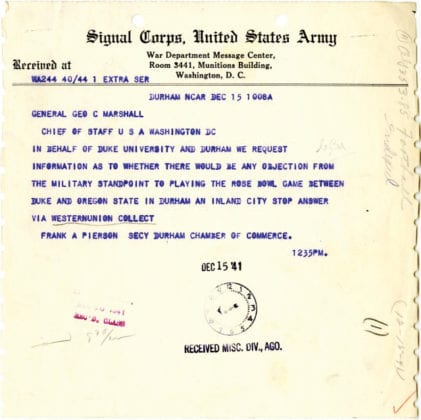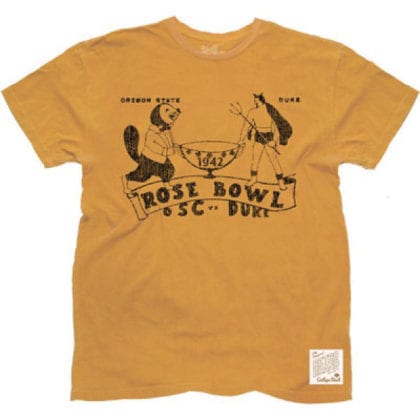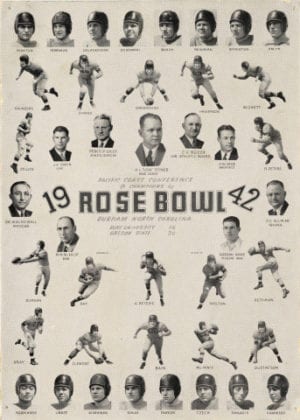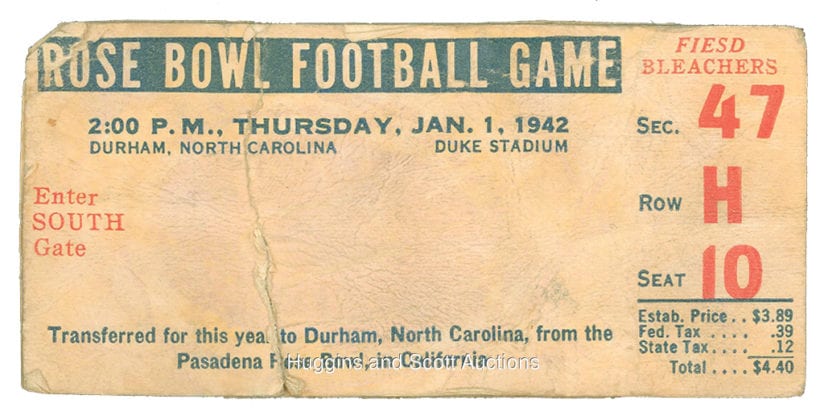One of the highlights of the New Year’s weekend is college football. All those great Bowl games to watch, cheering for your favorite team. Cordova has quite a number of Washington Husky fans, and they have a right to be fired up about the their UW squad this year. The Huskies finished the regular season ranked No. 4, and will battle for the National Championship in the College Playoffs.
Less known in Cordova are a small group of Oregon State followers. These Beaver Believers surface now and then, coming out of their Beaver Houses once every decade or so when their team makes a brief appearance on the National stage.
After all, since the first OSU football team took to the muddy fields in Corvallis back in 1895, only three Beaver squads have made it to the famous Rose Bowl in sunny Pasadena, California.
Actually, I need to correct that. Only two OSU team ever played in the Rose Bowl at Pasadena. I was there for one of them, to watch Michigan crush OSU, 34-7. The year was 1965, and the Michigan quarterback was bigger than almost every Beaver on the field. None-the-less, it was a great experience for a member of the CHS Class of 1962, numbering 17. The Rose Bowl seats 92,542. Oregon State also lost in Pasadena in 1957, falling to Iowa 35-19.
The other OSU Rose Bowl appearance is quite a story, not only because the Beavers won, but because the game wasn’t even played in Pasadena. Plus a fisherman from Washington who ran a seine boat out of Cordova for many years played a key role in the victory.
On January 1, 1942, Oregon State shocked heavily favored Duke 20-16 in front of 50,000 fans on a rainy afternoon at Duke’s Stadium in Durham, North Carolina.
Originally scheduled to be played in California, the Rose Bowl was moved across country due to fears about attacks by the Japanese on the West Coast following the attack on Pearl Harbor on December 7, 1941. With the devastation to the U.S. Navy’s Pacific Fleet, the military banned large public gatherings, such as the Rose Bowl, which were felt could be ripe targets.
Oregon State’s Beaver Express train left Corvallis on Dec. 19, for what would be a 21 day, 7,384 mile round trip. Sometimes they exercised and practiced in open field near whistle stops, and were often greeted by fans at train stations with home- made food. They stopped for formal practices on football fields in Chicago and Washington, D.C. East Coast sportswriters were having a field day. At the nation’s capital, sports columnist Francis E. Stan observed “… that as far as the man on the street is concerned Oregon State is a bush team on a coast-to-coast joy ride…”.
Oregon State spent the week before the game training in North Carolina. Skepticism continued. NBC announcer Bill Stern asserted that the Blue Devils could beat the Beavers by throwing 11 helmets on the field.
Finally Jan. 1 rolled round. In Pasadena, the Rose Bowl Queen and Court, all clad in regular street clothes, drove down a deserted Bowl parade route. There were no floats or roses, either there or 3,600 miles away in Durham.
The Beavers took to the field on a cold, damp day and shocked the nation, knocking heavily favored Duke on its heels from the start.
The first play of the game set the tone. Oregon State kicked off, and Beaver Lloyd Wickett, a 6-foot-191 pound tackle from Aberdeen, Washington, crushed Duke’s Tom Davis on the five-yard line, forcing a fumble. It seemed to set the tone for the whole game.
Oregon State continued to batter the Blue Devils. Legendary sportswriter Grantland Rice, whose “The Four Horsemen” article about the 1924 Army-Notre Dame game is widely regarded as the best sports story ever written, was at the game. At half time, one of his press box companions noted “You could see that Duke is being hit harder and keener then at any time during the season. Duke doesn’t seem quite to be used to this.”
Rice rode back West with the Oregon Staters after the game. In the classic prose of that Era, he later summarized: “That was the answer. They were a strong, husky-looking bunch… They had been hit hard all season, while Duke had been on a flock of picnics, largely in soft meadows.”
This fall’s Oregon Stater Alumni Association Magazine featured the 75th anniversary of OSU’s only Rose Bowl win, including a commemorative photo of the 1942 Rose Bowl team. Each player is shown in full uniform in an action pose. In the upper right-hand corner is a leather-helmeted Beaver, poised to tackle.
Unbelievably, this Beaver had a Cordova Connection.
Lloyd was the brother of Merle Wickett, who for several years was Superintendent of Alaska Packers cannery operations right here in Cordova. Merle and his wife Flora moved from Aberdeen to Cordova in 1936. Merle fished commercially, and eventually became head of APA’s local office. The couple lived on Railroad Row, and raised seven daughters, including Cordovans Kim Wickett Erby and Caroline Wickett Raymond. Merle’s brother Ed was a longtime highliner, operating the Glacier Queen, a 50-foot wooden seiner.
And what happened to Lloyd Wickett, after that famous play? He, like many other OSU players on that Rose Bowl championship team, soon went into the service. Wickett joined the Navy, and served as a training instructor in Aberdeen.
After the war ended, he and other OSU students who left the school to serve while just shy of enough credits to graduate were awarded their degrees. Wickett went on to play a year of professional ball for the Detroit Lions. He also began coming north to fish Prince William Sound in the summers, eventually skippering the Parakeet, a 50-foot steel APA boat, in the ’60s and ’70s. His crew included family members earning money for college education.
Lloyd caught a lot of salmon over the years out on Prince William Sound, but his greatest claim to fame may have been that crushing tackle that set the stage for Oregon State’s victory.
In the only Rose Bowl without roses.
Want more Cordova Chronicles? Click here to view the archives.


















